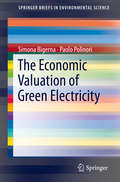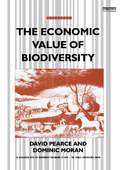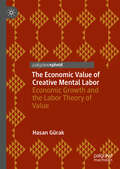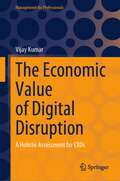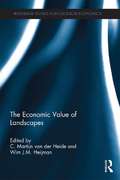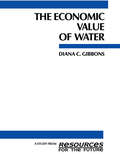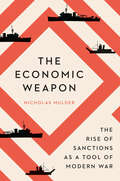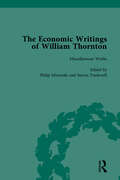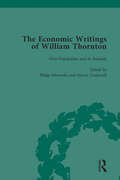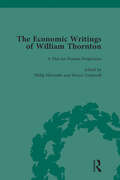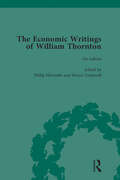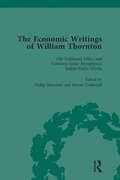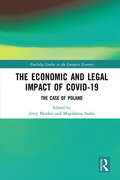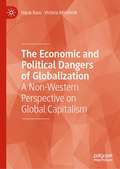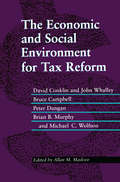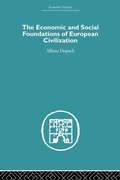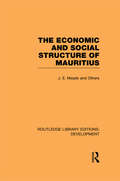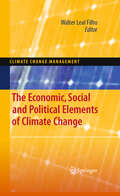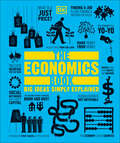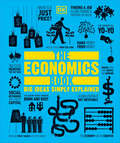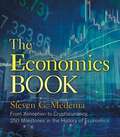- Table View
- List View
The Economic Valuation of Green Electricity (SpringerBriefs in Environmental Science)
by Simona Bigerna Paolo PolinoriThe aim of this book is to analyze the relationship between renewable energy sources and citizens, focusing both on demand and supply. Today, the consequences regarding the use of fossil energy are seen from a different perspective because the issues related to climate change are evident worldwide. Thus, climate change and resource depletion are real problems to be addressed for the welfare of society. Renewable energy sources (RES) are essential to reduce polluting emissions, but they can produce a range of environmental effects which might be detrimental to human activities as attested by the several types of the Nimby effect (“Not In My Back Yard”). This is because infrastructure siting usually offers different pros and cons to stakeholders and the local populations affected. Nevertheless empirical evidence shows that in many countries, society is willing to pay a significant amount to facilitate adoption of renewable technologies. With RES, citizens are called on to play a dual role – not only that of end consumers but often also stakeholders in the local production process. In this book we try to deal with this dual role played by the citizens to evaluate the actual public acceptance of RES. We address a specific and important area of the economic analysis: willingness to pay (WTP) and willingness to accept (WTA). The research evaluates the attitude of citizens towards the end use of green energy by investigating the likelihood of acceptance of a new infrastructures related to RES production. The book, therefore, is not about how to reconcile consumers and citizens, rather it explores the main determinants of peoples' behavior for a better understanding of this phenomenon.
The Economic Value of Biodiversity
by David Pearce Dominic MoranBiodiversity loss is one of the major resource problems facing the world, and the policy options available are restricted by inappropriate economic tools which fail to capture the value of species and their variety. This study describes in non-technical terms how cost-benefit analysis techniques can be applied to species and species loss, and how they provide a measure of the efficiency of conservation measures. Only when conservation can be shown to pass such a basic economic test, the authors claim, will it be incorporated into policies.;David Pearce has also written Blueprint for a Green Economy.
The Economic Value of Creative Mental Labor: Economic Growth and the Labor Theory of Value
by Hasan GürakThis book examines the role of creative mental labor in determining long-term economic growth, production costs, and product pricing. By redefining theories of value-price and growth in relation to creative mental labor, it acknowledges the role of human talent and skill in the creation of new technologies, productions, and productions methods, and highlights the impact this has on supply and demand dynamics. Traditional and neoclassical notions of human capital are challenged to present a new theory of growth that is more aligned with real life economics. This book reevaluates ideas of economic growth by contextualising technological advancement and sustainable long-term economic growth within ideas of creative mental labor and skilled mental labor. It will be of interest to students and researchers working on labour economics.
The Economic Value of Digital Disruption: A Holistic Assessment for CXOs (Management for Professionals)
by Vijay KumarThis book is a holistic impact study, replete with real-world examples, of digital transformation enhancing businesses and influencing managers' thinking. It links economic value with digital disruptions, arguing that these disruptions deliver economic benefits, boost shareholder value, and provide societal value. The central discourse is on the ability of digitization to make the world a better place to live in. The book analyses wealth creation due to digital disruption with a global span. It extensively incorporates anecdotal examples of disruptive digitization across countries, accentuating the impact of major digital disruptions. It is targeted at any professional interested in studying digitization's holistic impact. The book provides a discourse on digital topography to make business students industry-ready. Given the pervasive digital economy and a rapidly evolving business world, the book helps practicing managers better appreciate their digital environments. Management students who not only have to survive in this digital landscape but also thrive and chart out a lucrative career will benefit significantly from the book.
The Economic Value of Landscapes (Routledge Studies in Ecological Economics)
by C. Martijn van der Heide Wim J.M. HeijmanThis book aims to explore the avenue of landscape economics and provides the building blocks (from different scientific disciplines) for an economic analysis of landscapes. What exactly constitutes and determines the value of a landscape? It focuses on the value of landscapes in its broadest sense, thereby covering a variety of topics including stakeholder involvement in landscape design, landscape governance and landscape perceptions from different countries. Merely saying that landscapes have value or are important is not sufficient – not when resources are scarce and have alternative uses. Measuring and quantifying the economic value of changes in landscapes would help ensure that landscape management decisions are both (economically) rational and sound.
The Economic Value of Water
by Diana C. GibbonsGibbons examines the water supply problem through five case studies. The problems faced by these regions and the methods suggested to overcome them provide excellent models for the entire United States. The case studies---typically, expanding supplies---but economic efficiency principles lead to emphasizing managing the demand. In many cases, this means reducing demand by raising prices.
The Economic Way Of Thinking
by Paul Heyne Peter Boettke David PrychitkoThe Economic Way of Thinking goes beyond explaining the basic principles of micro- and macroeconomic analysis by showing readers a method of reasoning that teaches them how to apply these principles as tools. The authors expose readers to a method of reasoning that makes them think like an economist through example and application and also shows them how not to think, by exposing errors in popular economic reasoning.
The Economic Weapon: The Rise of Sanctions as a Tool of Modern War
by Nicholas MulderThe first international history of the emergence of economic sanctions during the interwar period and the legacy of this development Economic sanctions dominate the landscape of world politics today. First developed in the early twentieth century as a way of exploiting the flows of globalization to defend liberal internationalism, their appeal is that they function as an alternative to war. This view, however, ignores the dark paradox at their core: designed to prevent war, economic sanctions are modeled on devastating techniques of warfare. Tracing the use of economic sanctions from the blockades of World War I to the policing of colonial empires and the interwar confrontation with fascism, Nicholas Mulder uses extensive archival research in a political, economic, legal, and military history that reveals how a coercive wartime tool was adopted as an instrument of peacekeeping by the League of Nations. This timely study casts an overdue light on why sanctions are widely considered a form of war, and why their unintended consequences are so tremendous.
The Economic Writings of William Thornton Vol 1
by Philip Mirowski Steven TradewellThornton's writings are central to the history of the "Laws of Supply and Demand" and seminal in understanding the rise of neoclassical economics. Thornton has been cast as a minor player in John Stuart Mill's recantation of the wages fund doctrine. This text should show how he played a major role.
The Economic Writings of William Thornton Vol 2
by Philip Mirowski Steven TradewellThornton's writings are central to the history of the "Laws of Supply and Demand" and seminal in understanding the rise of neoclassical economics. Thornton has been cast as a minor player in John Stuart Mill's recantation of the wages fund doctrine. This text should show how he played a major role.
The Economic Writings of William Thornton Vol 3
by Philip Mirowski Steven TradewellThornton's writings are central to the history of the "Laws of Supply and Demand" and seminal in understanding the rise of neoclassical economics. Thornton has been cast as a minor player in John Stuart Mill's recantation of the wages fund doctrine. This text should show how he played a major role.
The Economic Writings of William Thornton Vol 4
by Philip Mirowski Steven TradewellThornton's writings are central to the history of the "Laws of Supply and Demand" and seminal in understanding the rise of neoclassical economics. Thornton has been cast as a minor player in John Stuart Mill's recantation of the wages fund doctrine. This text should show how he played a major role.
The Economic Writings of William Thornton Vol 5
by Philip Mirowski Steven TradewellThornton's writings are central to the history of the "Laws of Supply and Demand" and seminal in understanding the rise of neoclassical economics. Thornton has been cast as a minor player in John Stuart Mill's recantation of the wages fund doctrine. This text should show how he played a major role.
The Economic and Business History of Occupied Japan: New Perspectives (Perspectives in Economic and Social History)
by Thomas FrenchThe Occupation era (1945-1952) witnessed major change in Japan and the beginnings of its growth from of the ashes of defeat towards its status as a developmental model for much of the world. The period arguably saw the sowing of the seeds of the post-war flowering of what some term the ‘postwar Japanese economic miracle’. However, some scholars dispute this position and argue that the Occupation's policies and impacts actually hindered Japan's recovery. This volume addresses this question and others surrounding the business and economic history of this crucial period. The chapters presented in The Economic and Business History of Occupied Japan are authored by major scholars of the Occupation from the U.S., Japan, and Europe. The chapters are divided into three sections: 'Planning, reform and recovery', 'Industries under the Occupation', and 'Legacies of the Occupation era'. Following an introduction focusing on the historiographical background, the first section examines zaibatsu dissolution and its significance, the role of Japanese businessmen within the Occupation's reforms, the crucial impact of Japan's postwar Materials Crisis, and the impact of reform at the local level in Hokkaidō. Part two looks at a number of individual industries and their development during the era, including the fishing, automotive, and cotton spinning industries. The final section looks at the human impact of the changes of the initial postwar years, including the reintegration of repatriates into the Japanese labour force and the impact of changing working patterns on society and family life. This book covers a key period of the economic and business history of Japan and presents numerous new approaches and original contributions to the scholarship of the Occupation era. It will be of interest to scholars of modern Japan, economic history, business history, development studies and postwar U.S.-Japan relations.
The Economic and Legal Impact of Covid-19: The Case of Poland (Routledge Studies in the European Economy)
by Jerzy MenkesIn response to the outbreak of the COVID-19 pandemic, governments and international institutions took steps to contain the harmful consequences on citizens’ lives and health, as well as the economy. In the short term, the goal was to limit the spread of the virus and the effects of the restrictions on the economy and, in the longer run, to prevent the appearance of new cases, facilitate the end of social restrictions, reboot the economy, and return to a path of sustainable growth and development. This is an economic and legal exploration of the impact of the pandemic, in the Polish context, examining Polish society and the economy as well as the response of the Polish authorities to the pandemic. The choice of Poland as the subject of the research is justified by its specificity. On the one hand, Poland is a country undergoing systemic transformation with access to European and transatlantic institutions. On the other hand, in recent years, it has evolved towards a hybrid democracy and is currently diverging away from the EU project. The book presents Poland’s legal and institutional response to the pandemic, analysed through the prism of common European values and Poland’s international commitments. It signposts the financial solutions adopted by the EU in the aftermath of the outbreak to assess how they will be used in combatting the short and longer-term consequences of the pandemic in Poland. The book is an introduction to original research, shaped by the novelty of the subject matter, and as such, will be essential reading for students and researchers of economics, law, and international relations.
The Economic and Political Dangers of Globalization: A Non-Western Perspective on Global Capitalism
by Dipak Basu Victoria MiroshnikThis book explores the economic and political impact of US aggression and the rise of China. Charting the impact of globalization from the Greek and Roman Empires onwards, the contemporary challenges posed by globalization is analysed in relation to both multinational companies and Wall Street banks. The influence of the World Trade Organization is investigated, with a particular focus on how it has created a Washington consensus throughout the world. This book aims to provide a non-Western perspective on global capitalism and the dangers it creates. It will be relevant to students and researchers interested in political economy, economic history, and development economics.
The Economic and Social Environment for Tax Reform
by Allan M. MasloveMajor economic and social developments that will determine the context for tax reforms in the 1990s are the subject of this volume. They include the globalization of markets, free trade arrangements, changing technology and production processes, macro-economic policies and conditions in Canada, and population growth and changes in demographic structure.
The Economic and Social Foundations of European Civilization
by Alfons DopschThis is a reproduction of a book published before 1923. This book may have occasional imperfections such as missing or blurred pages, poor pictures, errant marks, etc. that were either part of the original artifact, or were introduced by the scanning process. We believe this work is culturally important, and despite the imperfections, have elected to bring it back into print as part of our continuing commitment to the preservation of printed works worldwide. We appreciate your understanding of the imperfections in the preservation process, and hope you enjoy this valuable book.
The Economic and Social History of Brazil since 1889
by Herbert S. Klein Francisco Vidal LunaThis is the first complete economic and social history of Brazil in the modern period in any language. It provides a detailed analysis of the evolution of the Brazilian society and economy from the end of the empire in 1889 to the present day. The authors elucidate the basic trends that have defined modern Brazilian society and economy. In this period Brazil moved from being a mostly rural traditional agriculture society with only light industry and low levels of human capital to a modern literate and industrial nation. It has also transformed itself into one of the world's most important agricultural exporters. How and why this occurred is explained in this important survey.
The Economic and Social Impact of the COVID-19 Pandemic: Romania in a European Context (Contributions to Economics)
by Valentina Vasile Elena BunduchiThis volume examines the effects of the COVID-19 pandemic on the labor market and the business environment in the European Union (EU), with a specific focus on Romania, the least developed country in the EU. The book emphasizes the need to rethink recovery models and suggests a new normal based on the pillars of economic, climatic, and social resilience. Is proposed the redefinition the policies’ mix that will allow fundamental changes in development, focused also on social and societal profit, the redefinition of productivity and environmental performance of businesses, and the rebalancing of work and leisure life. The COVID-19 crisis not only accelerated the digital transformation of society but also reconfigured the coordinates of economic development by prioritizing sustainable development for all, based on green jobs as a starting point for business innovation and decent jobs for active social protection. Following this approach, the contributions discuss selected issues with importance to the development of society in the post-pandemic world. The book is of interest to students, scholars and researchers in economics, business, management and political science, as well as to policy makers and practitioners, for a better understanding of the impact of the COVID-19 pandemic on the labor market and the business environment in European Union.
The Economic and Social Structure of Mauritius (Routledge Library Editions: Development)
by James E MeadeFirst published in 1961, this reissue examines the contemporary economic problems of Mauritius alongside those social problems which have a bearing on economic development. As a small and isolated economy, marked by a very rapid rate of contemporary population growth, by an extreme concentration on a single product, and by a great diversity of racial, religious and linguistic groups within the population, Mauritius is a representative microcosm of the economic problems of a large part of the developing world. The book considers the impact of a lower birth rate, emigration and economic development upon the economy of Mauritius, examining in detail the labour market, the prospects for agricultural and industrial development, the financial system and the education system.
The Economic, Social and Political Elements of Climate Change
by Walter Leal FilhoA unique feature of this book is its strong practice-oriented nature: it contains a wide range of papers dealing with the social, economic and political aspects of climate change, exemplifying the diversity of approaches to climate change management taking place all over the world, in a way never seen before. In addition, the book describes a number of projects and other initiatives happening in Africa, Asia, Europe, Latin American and the Australasian region, providing a profile of the diversity of works taking place today.
The Economics Book: Big Ideas Simply Explained (DK Big Ideas)
by DKLearn about trade and global economic crises in The Economics Book.Part of the fascinating Big Ideas series, this book tackles tricky topics and themes in a simple and easy to follow format. Learn about Economics in this overview guide to the subject, great for novices looking to find out more and experts wishing to refresh their knowledge alike! The Economics Book brings a fresh and vibrant take on the topic through eye-catching graphics and diagrams to immerse yourself in. This captivating book will broaden your understanding of Economics, with:- More than 100 of the greatest ideas in economics- Packed with facts, charts, timelines and graphs to help explain core concepts- A visual approach to big subjects with striking illustrations and graphics throughout- Easy to follow text makes topics accessible for people at any level of understandingThe Economics Book is a captivating introduction to historically important and emergingideas in a field of science that often confuses newcomers, aimed at adults with an interest in the subject and students wanting to gain more of an overview. Here you&’ll discover more than 100 of the greatest ideas, from the earliest experiences of trade to global economic crises, through exciting text and bold graphics.Your Economics Questions, Simply ExplainedThis fresh new guide examines everything from the current financial climate of markets in turmoil and whole economies in melt-down. If you thought it was difficult to learn about this field of science, The Economics Book presents key information in a clear layout. From the earliest development of private property to the cutting-edge modern game theory, learn about centuries of economic thought, making clear even the most complex of concepts.The Big Ideas SeriesWith millions of copies sold worldwide, The Economics Book is part of the award-winning Big Ideas series from DK. The series uses striking graphics along with engaging writing, making big topics easy to understand.
The Economics Book: Big Ideas Simply Explained (DK Big Ideas)
by DKLearn about trade and global economic crises in The Economics Book.Part of the fascinating Big Ideas series, this book tackles tricky topics and themes in a simple and easy to follow format. Learn about Economics in this overview guide to the subject, great for novices looking to find out more and experts wishing to refresh their knowledge alike! The Economics Book brings a fresh and vibrant take on the topic through eye-catching graphics and diagrams to immerse yourself in. This captivating book will broaden your understanding of Economics, with:- More than 100 of the greatest ideas in economics- Packed with facts, charts, timelines and graphs to help explain core concepts- A visual approach to big subjects with striking illustrations and graphics throughout- Easy to follow text makes topics accessible for people at any level of understandingThe Economics Book is a captivating introduction to historically important and emergingideas in a field of science that often confuses newcomers, aimed at adults with an interest in the subject and students wanting to gain more of an overview. Here you’ll discover more than 100 of the greatest ideas, from the earliest experiences of trade to global economic crises, through exciting text and bold graphics.Your Economics Questions, Simply ExplainedThis fresh new guide examines everything from the current financial climate of markets in turmoil and whole economies in melt-down. If you thought it was difficult to learn about this field of science, The Economics Book presents key information in a clear layout. From the earliest development of private property to the cutting-edge modern game theory, learn about centuries of economic thought, making clear even the most complex of concepts.The Big Ideas SeriesWith millions of copies sold worldwide, The Economics Book is part of the award-winning Big Ideas series from DK. The series uses striking graphics along with engaging writing, making big topics easy to understand.
The Economics Book: From Xenophon to Cryptocurrency, 250 Milestones in the History of Economics (Union Square & Co. Milestones)
by Steven G. MedemaThis beautiful, authoritative volume in the popular Milestones series looks at the vital intersection among business, finance, and money. From the philosophical dialogues of Ancient Greece and the moral contemplations of Medieval Europe to deregulation and cryptocurrency, The Economics Book presents 250 milestones in the science of the production, sale, and purchase of goods and services. These concise, engaging, informative essays examine the full gamut of subjects, revealing both the entertaining stories and the world-changing developments in the field. They shed thoughtful light on the field&’s significant subdisciplines, including: mercantilism, the Enlightenment, communism, econometrics, Keynesianism, macroeconomics, game theory, cliometrics, market design theory, and the Keynesian Resurgence that emerged in the wake of the Great Recession. This vibrant, colorfully illustrated collection will captivate you with a bird&’s-eye view of the development of the world&’s markets, what has shaped and affected them, and what drives them today.
